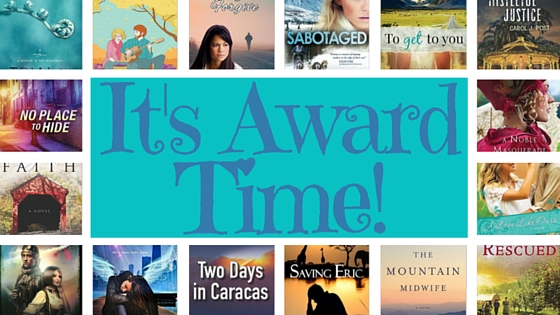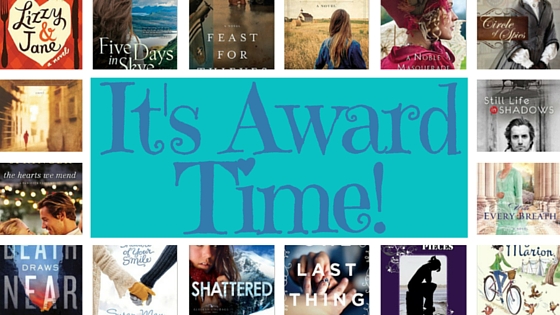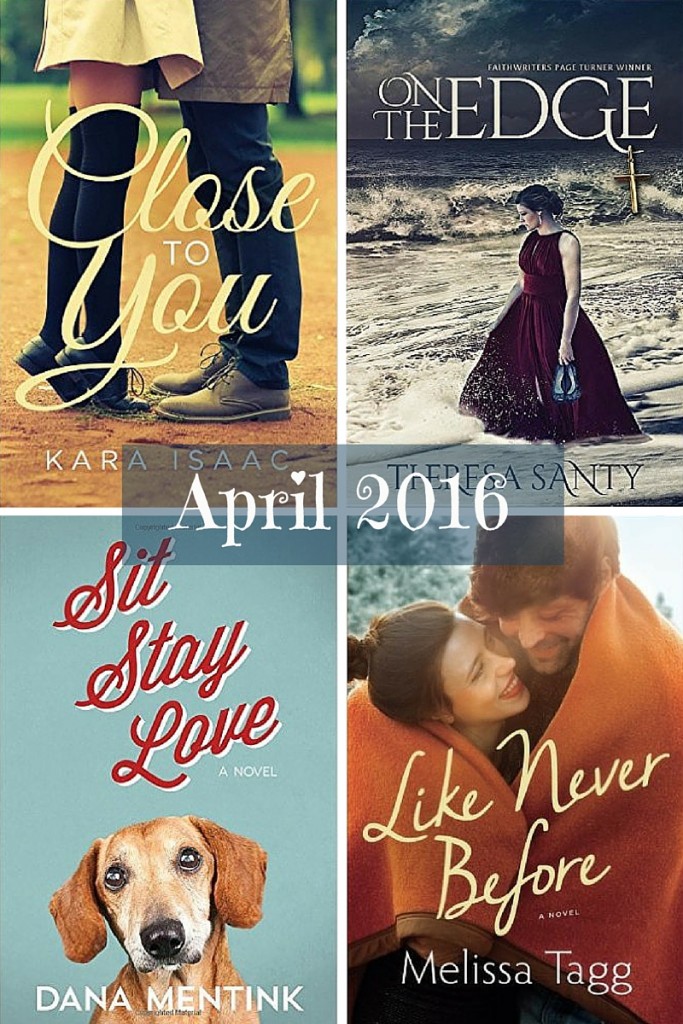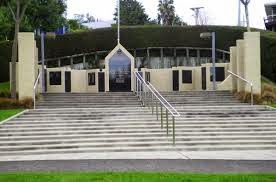It’s Award Time!
Over the last two weeks I’ve introduced you to my six favourite awards for Christian novels (I’d love to be on any of these lists one day!). Today I’m back with the Christy Award finalists, and the INSPY Award shortlists. Lots more books for the to-read pile!
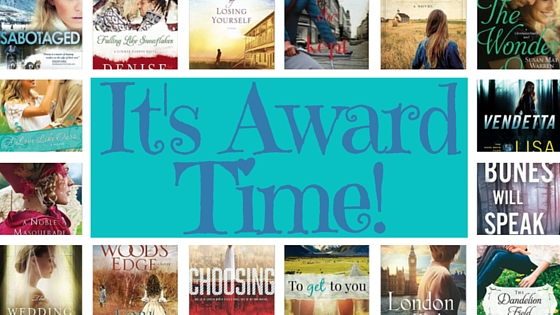
The 2016 Christy Award Finalists
Contemporary
The Art of Losing Yourself by Katie Ganshert (WaterBrook Press)
As Waters Gone By by Cynthia Ruchti (Abingdon Press)
The Sea Keeper’s Daughters by Lisa Wingate (Tyndale House Publishers)
Contemporary Romance/Suspense
Falling Like Snowflakes by Denise Hunter (Thomas Nelson
Sabotaged by Dani Pettrey (Bethany House Publishers)
The Wedding Chapel by Rachel Hauck (Zondervan
Contemporary Series
Anna’s Healing by Vannetta Chapman (Harvest House Publishers)
Come Rain or Come Shine by Jan Karon (G.P. Putnam’s Sons)
Crazy Little Thing Called Love by Beth K. Vogt (Howard Books)
First Novel
The Choosing by Rachelle Dekker (Tyndale House Publishers)
Irish Meadows by Susan Anne Mason (Bethany House Publishers)
A Noble Masquerade by Kristi Ann Hunter (Bethany House Publishers)
Historical
The Girl from the Train by Irma Joubert (Thomas Nelson)
Secrets She Kept by Cathy Gohlke (Tyndale House Publishers)
The Wood’s Edge by Lori Benton (WaterBrook Press)
Historical Romance
Beyond All Dreams by Elizabeth Camden (Bethany House Publishers)
The Lost Heiress by Roseanna M. White (Bethany House Publishers)
Luther and Katharina by Jody Hedlund (WaterBrook Press)
To Win Her Favor by Tamera Alexander (Zondervan)
Suspense
The Bones Will Speak by Carrie Stuart Parks (Thomas Nelson)
Twisted Innocence by Terri Blackstock (Zondervan)
Vendetta by Lisa Harris (Revell)
Visionary
The Five Times I Met Myself by James L. Rubart (Thomas Nelson)
A Time to Speak by Nadine Brandes (Enclave Publishing)
Waking Beauty by Sarah E. Morin (Enclave Publishing)
Young Adult
The Choosing by Rachelle Dekker (Tyndale House Publishers)
Rebel by R.J. Anderson (Enclave Publishing)
To Get to You by Joanne Bischof (Independently Published)
Winners will be announced the last week in June.
The 2016 INSPY Award Finalists
Debut
The Thorn Bearer by Pepper D. Basham (Vinspire Publishing)
Jaded by Varina Denman (David C. Cook)
A Noble Masquerade by Kristi Ann Hunter (Bethany House)
Love’s Rescue by Christine Johnson (Revell)
Irish Meadows by Susan Anne Mason (Bethany House)
General Fiction
A Cup of Dust by Susie Finkbeiner (Kregel)
The Art of Losing Yourself by Katie Ganshert (Waterbrook)
Secrets She Kept by Cathy Gohlke (Tyndale)
Water From My Heart by Charles Martin (Center Street)
The Bronte Plot by Katherine Reay (Thomas Nelson)
Contemporary Romance/Romantic Suspense
London Tides by Carla Laureano (David C. Cook)
The Dandelion Field by Kathryn Springer (Zondervan)
Crazy Little Thing Called Love by Beth K. Vogt (Howard)
A Love Like Ours by Becky Wade (Bethany House)
The Wonder of You by Susan May Warren (Tyndale)
Historical Romance
The Wood’s Edge by Lori Benton (Waterbrook)
Not by Sight by Kate Breslin (Bethany House)
The Mistress of Tall Acre by Laura Frantz (Revell)
Luther and Katharina by Jody Hedlund (Waterbrook)
Through Waters Deep by Sarah Sundin (Revell)
Speculative Fiction
The Methuselah Project by Rick Barry (Kregel)
Heir of Hope by Morgan L. Busse (Enclave Publishing)
The Shock of Night by Patrick W. Carr (Bethany House)
The Curse of Crow Hollow by Billy Coffey (Thomas Nelson)
Embers by Ronie Kendig (Enclave Publishing)
Mystery and Thriller
The Last Con by Zachary Bartels (Thomas Nelson)
A.D. 33 by Ted Dekker (Center Street/Hachette)
Vendetta by Lisa Harris (Revell)
Falcon by Ronie Kendig (Shiloh Run Press/Barbour)
The Bones Will Speak by Carrie Stuart Parks (Thomas Nelson)
Literature for Young Adults
Season of Fire by Lisa T. Bergren (Blink/Zondervan)
Shades of Doon by Carey Corp and Lorie Langdon (Blink/Zondervan)
The Choosing by Rachelle Dekker (Tyndale)
An Uncertain Choice by Jody Hedlund (Zondervan)
Siren’s Fury by Mary Weber (Thomas Nelson)
Winners will be announced on 28 June 2016.


